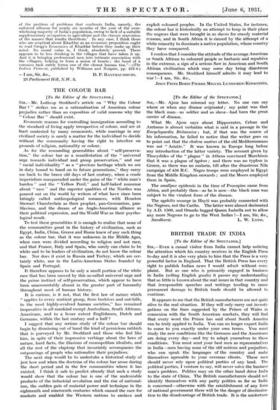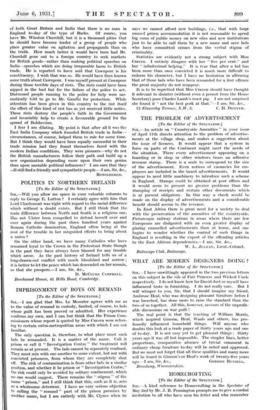BRITISH TRADE IN INDIA
[To the Editor of the SPECTATOR.] SIR,—Even a casual visitor from India cannot help noticing the attention which his country receives in the English Press to-day and it is also very plain to him that the Press is a very powerful factor in England. That the British Press has every right to publish Indian news I would admit without com- plaint. But as one who is primarily engaged in business in India (selling English goods) it passes my understanding that so little is known about the real issues in that country and that irresponsible speeches and writings tending to cause permanent damage to British trade should be allowed to continue.
It appears to me that the British manufacturers are not quite alive to the real situation. If they will only carry out investi- gations on the lines suggested by the Prince of Wales in connexion with the South American markets, they will find that every word the Prince has said about South America can be truly applied to India. You can no longer expect India to come to you exactly under yobr own terms. You must study the new conditions like the Germans and the Americans are- doing every day—and try to adapt yourselves to those conditions. You must send your best men as representatives in India—men having none of the old notions and prejudices, who can speak • the languages of the country and make themselves agreeable to your overseas clients. These men should never -rely' upon political parties of any land. The political parties, I venture to say, will never solve the business man's problem. Politics may on the other hand drive India to the state of China. The British manufacturers should not identify themselves with any party politics as far as India is concerned—otherwise with the establishment of any form of national government there will be the danger of discrimina- tion to the disadvantage of British trade. It is the misfortune of both Great Britain and India that there is no man in England to-day of the type of Burke. Of course, you have Mr. Winston Churchill, but it is a thousand pities that he should have become leader of a group of people who place greater value on agitation and propaganda than on the truth. How much better it would have been had Mr. Churchill gone out to a foreign country to seek markets for British goods—rather than making political speeches on India—speeches which are doing irreparable harm to British trade. He is reported to have said that Cawnpore is his constituency. I wish that was so. He would have then known some truth about Cawnpore. I was myself present at Cawnpore during those terrible days of riots. The riots could have been nipped in the bud but for the failure of the police to act. Distressed people running to the police for help were sar- castically told to go to Mr. Gandhi for protection. While attention has been given in this country to the riot itself the effect of this kind of riot has as yet received little notice. These riots destroy the people's faith in the Government and invariably help to create a favourable ground for the spread of Bolshevism.
I fear I am dilating. My point is that after all it was the East India Company which founded British trade in India— circumstances, of course, helped them to rule for some time. But I think they would have been equally successful in their trade mission had they found themselves faced with the modem Indian conditions. They were pioneers—why do not the British manufacturers follow their path and build up a new organization depending more upon their own genius than upon unstable political influences? I am sure that they will still find a friendly and sympathetic people.—I am, Sir, &c., BEWILDERED.







































 Previous page
Previous page